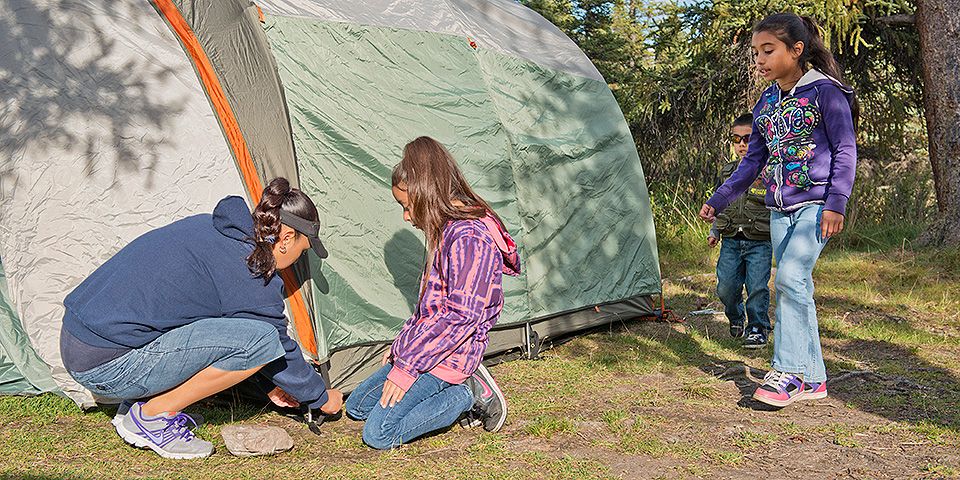Tips for Camping with Kids

Before an Overnight Trip
· Practice camping at home: If your kids are outdoor newbies, pitch a tent in the backyard oreven inside your home. Let them hang out in it and sleep in it so they becomecomfortable with a new sleeping environment.
· Take a trial run: Before your overnighter, try a family day outing at a close-to-homepark. Spend a half-day or so at a lakeshore or park and see how your kids reactto the experience.
· Take notes: Writedown reminders for future trips: "Pack more sunscreen." "Bringlong pants." "Leave bongos home."
Preparing for a Trip
· Be enthusiastic: Why should kids get fired-up about a family camping trip if you'renot?
· Involve your kids: Make trip planning a family affair. Ask kids for ideas of things todo or see at your destination. Take their input seriously.
· Kids as packers: Give children the responsibility to pack their own camping gear athome (using a list you've created). A parent should double-check a child'spacking job before leaving home.
· Keeping kids (somewhat) organized: Have your kids pack personals item in a duffelbag and encourage them to always return those items to that duffel. Eachchild's duffel should be a different color for easy identification.
· Favorite toys: Let kids bring some of their favorite playthings so the campsitedoesn't feel entirely foreign to them.
· Friends are valuable: It can be fun for kids to camp with another family that has kids.Your kids may get bored with adults after a while. With playmates, they couldbe happily occupied for days.
· Bring bikes: Ifit's a long way from your campsite to the beach or play area, it's faster (andmore fun) to use a bike instead of walking or firing up your vehicle. Bikeskeep kids entertained, too.
· Check fire restrictions: Planning on a campfire? Before you leave home, make some calls todetermine if campfires are permitted at your chosen campground. If not, makesure everyone in the family knows in advance. There's no bigger disappointmentto a kid who has packed all the s'more fixings than to discover that a burn banis in effect.
At the Campground
· Exude a positive vibe: The first rule of camping with kids? Be prepared to cope withinconvenience. Everything is in a different place. The bathroom is no longerdown the hall, it's 6 campsites down the path. As an adult, you must lead byexample with an upbeat, can-do attitude.
· Organize: Establishfixed locations for important items, such as, "The forks and spoons are inthe blue tub," and "flashlights are in the green stuff sack."
· Then stay organized: Remind everyone to always return items to their establishedlocations so others can find them. If you're especially industrious, create areference list of these items and tape it someplace obvious.
· Keep everyone oriented: Help kids memorize the number of your campsite or point outlandmarks ("We're 4 sites from the amphitheater") to help themremember its location.
· Make kids feel important: Kids like to be involved. Assign them some meaningful camp chores,such as gathering firewood or collecting water from the pump. Recognize theircontributions with praise or a treat (or both).
· Be safe: Yourkids should always carry a whistle (teach them to blow it if they becomeseparated from you) and have easy access to a flashlight or headlamp. Attach alanyard to both the whistle and light and tie them to one of the child's beltloops.
· Wildlife: Askpark rangers about wildlife activity in the area you are visiting. As theadult, you need to take the lead and understand any precautions necessary (suchas proper food storage or how to react during an up-close encounter) for safelycoexisting with wildlife. Educate your children about the importance of notfeeding wild animals (it negatively alters their food-gathering patterns) andtreating wildlife with respect and caution so everyone stays safe.
Spending Time Outdoors
Make the most of nature: Look for wildlife. Check out bugs. Examinerocks. Identify birds, flowers, clouds, constellations. Lead kids on a rockscramble. Show interest in things that interest them. Bring a field guide tohelp you identify and learn about the things they find.
· Be active, stay loose: Try to keep your kids active without following a regimentedschedule. If they're entertained by skipping rocks on the water, give them timeto perfect the multiple-skip fling.
· Attend ranger talks: If you're camping at a state or national park, attend the ranger'sevening talk. Ask staff if the park offers a junior-naturalist program or otherkid-focused activities.
· Geocaching: AGPS-guided treasure hunt engages kids physically and mentally. Check our linkto geocaching tosee if any caches are hidden in the area you'll be visiting.
· Share time together: "Hey, mom, remember when we saw that deer?" Great memoriesare one of the payoffs of a camping trip. Come home with the sort of storiesthat can only be created outdoors. Shakespeare must have been camping when hewrote, "One touch of nature makes the whole world kin."
· Foot bags: Sosimple, so entertaining.
